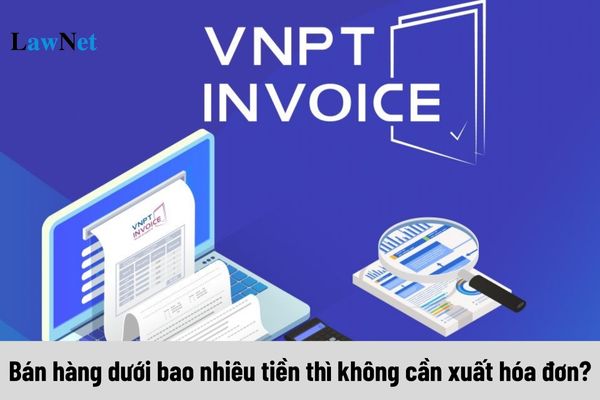Vietnam: What is the minimum value of goods that does not require an invoice?
Vietnam: What is the minimum value of goods that does not require an invoice?
According to Clause 1, Article 90 of the Law on Tax Administration 2019 regarding principles for the creation, management, and use of electronic invoices:
Principles for the creation, management, and use of electronic invoices
1. When selling goods or providing services, the seller must issue an electronic invoice to the buyer according to the standard data format and must fill in all contents as prescribed by tax laws and accounting laws, regardless of the value of each sale of goods or provision of services.
...
Simultaneously, according to Clause 1, Article 4 of Decree 123/2020/ND-CP it is stipulated as follows:
Principles for the creation, management, and use of invoices and documents
1. When selling goods or providing services, the seller must issue an invoice to deliver to the buyer (including cases where goods, services are used for promotion, advertisement, samples; goods, services given as gifts, donations, exchanges, employee salary, and internal consumption (excluding goods internally circulated for further production process); issuance of goods under the forms of loans, borrowing, or returning) and must fill out the invoice contents in accordance with Article 10 of this Decree, in the case of using electronic invoices, it must comply with the standard data format of the tax authority as prescribed in Article 12 of this Decree.
...
Thus, there is currently no regulation regarding the minimum amount requiring an invoice. Sellers must always issue invoices to buyers regardless of the order value.

Vietnam: What is the minimum value of goods that does not require an invoice? (Image from Internet)
What are contents must a sales invoice in Vietnam?
Based on Article 10 of Decree 123/2020/ND-CP, the invoice must ensure it contains the following contents:
- Invoice name, invoice symbol, invoice form number symbol, invoice number.
- Name of the carbon copy invoice applied for invoices printed by tax authorities as guided by the Ministry of Finance.
- Invoice number
- Name, address, tax code of the seller.
- Name, address, tax code of the buyer.
- Name, unit of measure, quantity, price of goods, services; amount without value-added tax, VAT rate, total value-added tax amount by tax rate, total VAT amount, total payment with VAT.
- Signature of the seller, signature of the buyer.
- Date of invoice creation as guided in Article 9 Decree 123/2020/ND-CP displayed in the format of day, month, and year of the solar calendar.
- The digital signature time on the electronic invoice is the time when the seller and buyer use digital signatures to sign on the electronic invoice displayed in the format of day, month, and year of the solar calendar. In the case of an electronic invoice whose digital signature time differs from the time of invoice creation, the tax declaration time is the invoice creation time.
- Tax authority code for electronic invoices with tax authority codes as prescribed in Clause 2, Article 3 Decree 123/2020/ND-CP.
- Fees, state budget fees, trade discounts, promotions (if any) as guided in point e, Clause 6, Article 10 Decree 123/2020/ND-CP and other related contents (if any).
- Name, tax code of the organization commissioned to print invoices for invoices printed by tax authorities.
- Language, figures, and currency shown on invoices.
- Other contents on the invoice.
Note: Except for some cases as specified in Clause 14, Article 10 Decree 123/2020/ND-CP which do not necessarily include all the contents as mentioned above.
How many types of invoices are there in Vietnam?
According to Article 8 of Decree 123/2020/ND-CP, the types of invoices are stipulated as follows:
Types of Invoices
Invoices stipulated in this Decree include the following types:
1. Value-added tax invoices are for organizations paying value-added tax by the deduction method used in the following activities:
a) Sale of goods, provision of services domestically;
b) International transport activities;
c) Export to tax-free zones and cases deemed as exports;
d) Export of goods, provision of services to foreign countries.
2. Sales invoices are for the following organizations and individuals:
a) Organizations, individuals declaring, calculating value-added tax by the direct method used in the following activities:
- Sale of goods, provision of services domestically;
- International transport activities;
- Export to tax-free zones and cases deemed as exports;
- Export of goods, provision of services to foreign countries.
b) Organizations, individuals in tax-free zones when selling goods, providing services domestically and when selling goods, providing services between organizations, individuals in tax-free zones, exporting goods, providing services to foreign countries, the invoice clearly states "For organizations, individuals in tax-free zones."
3. Electronic invoices for selling public assets are used when selling the following assets:
a) Public assets at agencies, organizations, units (including state-owned houses);
b) Infrastructure assets;
c) Public assets assigned by the State to enterprises for management not calculated in the state's capital portions in enterprises;
d) Assets of projects using state capital;
dd) Assets are established as state ownership;
e) Public assets recovered under the decision of competent authorities;
g) Materials recovered from handling public assets.
4. Electronic invoices for selling national reserve goods are used when agencies, units in the national reserve system sell national reserve goods according to legal regulations.
...
Thus, currently, there are four types of invoices:
- Value-added tax invoices
- Sales invoices
- Electronic invoices for selling public assets
- Electronic invoices for selling national reserve goods
Besides the types of invoices above, there are other types of invoices, including:
- Stamps, tickets, cards with forms and contents as stipulated in this Decree;
- Receipt vouchers for air transport fares; documents collecting international transport charges; documents collecting banking service fees, except for stamps, tickets, cards whose form and content are issued following international practices and relevant legal regulations.

